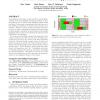Free Online Productivity Tools
i2Speak
i2Symbol
i2OCR
iTex2Img
iWeb2Print
iWeb2Shot
i2Type
iPdf2Split
iPdf2Merge
i2Bopomofo
i2Arabic
i2Style
i2Image
i2PDF
iLatex2Rtf
Sci2ools
ICS
2005
Tsinghua U.
2005
Tsinghua U.
System noise, OS clock ticks, and fine-grained parallel applications
As parallel jobs get bigger in size and finer in granularity, “system noise” is increasingly becoming a problem. In fact, fine-grained jobs on clusters with thousands of SMP nodes run faster if a processor is intentionally left idle (per node), thus enabling a separation of “system noise” from the computation. Paying a cost in average processing speed at a node for the sake of eliminating occasional processes delays is (unfortunately) beneficial, as such delays are enormously magnified when one late process holds up thousands of peers with which it synchronizes. We provide a probabilistic argument showing that, under certain conditions, the effect of such noise is linearly proportional to the size of the cluster (as is often empirically observed). We then identify a major source of noise to be indirect overhead of periodic OS clock interrupts (“ticks”), that are used by all general-purpose OSs as a means of maintaining control. This is shown for various grain sizes, p...
| Added | 27 Jun 2010 |
| Updated | 27 Jun 2010 |
| Type | Conference |
| Year | 2005 |
| Where | ICS |
| Authors | Dan Tsafrir, Yoav Etsion, Dror G. Feitelson, Scott Kirkpatrick |
Comments (0)

